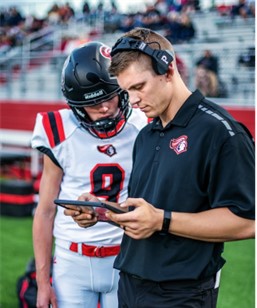Mike Golub is the President of SlamBall, a one-of-a-kind sports and entertainment property in markets around the world, combining the best elements of basketball, football, and hockey, infused with the essence of technology. In the following article, Mike Golub discusses how to build a winning culture in the wide world of sports.
Sports teams want nothing more than to win. However, it takes an effective to manager to lead their team toward success. In this industry, managers need a combination of individual skills and cohesive work to ensure their players perform exceptionally and achieve their goals.
From clear communication to SMART objectives to team culture to leadership strategies, building a winning atmosphere takes a myriad of well-implemented tactics.
Mike Golub Says Clear Communication Is the Cornerstone of Effective Team Management
A clear, open communication channel between staff, coaches, and players fosters trust, cooperation, and consistency. But contrary to popular belief, it isn't just vital to communicate with the team as a whole, but also on a
one-to-one basis.
Happy groups contain happy individuals. Team managers can craft happy individuals by knowing how to talk to all the different personalities on their teams. Regular one-to-one interactions away from the main team meetings are a must to ensure productive communication remains.
Mike Golub notes that with this said, communication only works properly when it's a two-way street. Managers must be ready and able to listen to players and use dialog constructively for performance improvement. Genuinely taking the team's perspectives on board is a key requirement — one that's often overlooked.
SMART Objectives for Improved Focus and Motivation
Mike Golub explains that teams can't perform to their expected standards if they aren't sure what said standard is. This is where SMART objectives come into play, a favorite among many corporate managers.
Under the SMART objectives requirements, goals need to be:
- Specific
- Measurable
- Achievable
- Relevant
- Time bound
Such goals give teams direction, helping them maintain motivation and concentration in both practice and games.
Mike Golub reports that coaches and managers should include the players when selecting SMART goals. That way, the team has a much-needed sense of ownership and responsibility, encouraging them to meet the objectives.
A Team Culture for Cohesion
Sport success lies in the creation of a strong team culture, where players and managers share equal beliefs, visions, and values. Those who have this all-important characteristic are much more likely to collaborate well, overcome challenges, and achieve the aforementioned objectives.
Mike Golub says that managers should collaborate with other staff members to foster a team culture that highly regards respect, proper conduct, and cooperation. Sometimes, this can be easier said than done, but it's certainly a worthwhile endeavor for teams, regardless of the sport.

 Being Analytical Changes Everything for the Better
Being Analytical Changes Everything for the Better
When the training goes well and the players translate all they've learned into action on the field, it's easy for managers to fall into the "my job is done" trap. However, great sports team managers understand that this isn't where the journey ends.
Mike Golub explains that managers must use their analytical skills by going back over everything the team did, figuring out how to improve based on any missteps during the game. Regardless of the team's ranking, there is always room to improve.
Implementing the Right Leadership Strategy at the Right Time
There are three leadership styles in sports management (autocratic, democratic, and laissez-faire), and each one has its place. It's up to the coach and manager to decide which strategy should be implemented based on the situation and the dynamics of the team.
Mike Golub says, generally speaking, effective managers will flip-flop between autocratic and democratic leadership, rarely or never using the laissez-faire option. As for the most effective? Research in 1939 mentions the best style is democratic, with too much autocratic causing athletes to decide they don't want to work with the coach.
Autocratic Leadership
In this approach, the leader makes the decision and their word is final. They do not take other perspectives into account. Consider it the traditional leadership style. Sir Alex Ferguson is perhaps the best example of
autocratic leadership.
Democratic Leadership
Mike Golub This style sees leaders determining what's needed, seeks feedback, and then decides how to move forward. Jurgen Klopp is known for this
democratic approach, seeing increased motivation and improved performance as a result.
Laissez-Faire Leadership
Leaders don't take an active role with this one. They explain what must happen but will ask advice from the players, allowing them to make the final decision. While perhaps the gentlest approach, it isn't deemed effective as it can lead teams to make poor decisions due to personal preference.

 Being Analytical Changes Everything for the Better
Being Analytical Changes Everything for the Better